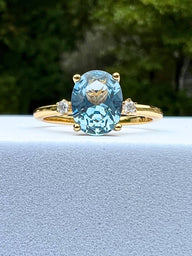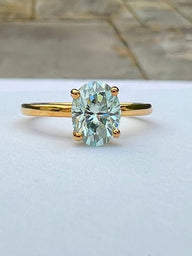FREE SHIPPING | BUY NOW, PAY LATER
We're very happy to see a surge in people considering buying their jewelry, and other items, from companies that practice sustainability and do their best to make ethical decisions. Since the pandemic began, maybe you started to reconsider how you were living as a result of spending more time at home and having some lengthy, in-depth chats about life with your devoted house plants. It doesn't matter how you got here, we're just glad you did. Since most companies won't tell you that they don't care about workers or the environment, here are some guidelines to know when choosing a jewelry company to do business with.

The Kimberly Process is beyond flawed
Any company claiming to be ethical because their diamonds are Kimberly Process Certified is just hiding behind a certification scheme, hoping that consumers don't find out. You can find more information about it in a previous article The Ugly Truth About The Kimberly Process, but the short version is that it's next to impossible to trace a gemstone's origins, as it will cross too many paths before the end user see's it. Also, the Kimberly Process doesn't account for human exploitation, environmental damage, or even atrocities like slavery...as long as a diamond, hasn't directly funded a conflict, it's conflict-FREE under the scheme.
Lab grown gemstones and recycled metals are better
To address the elephant in the room, yes, we have an incentive to tell you to choose companies that sell lab grown gemstones with recycled metals because that's what we sell. But the reason we started this company is that it's something we truly believe in. Even if you don't buy from us, we hope you consider other companies that do these two things.
There's no way to trace a gemstone's origins. Even if a particular country's gemstone mining industry has been sanctioned, it's been shown time and again that those gemstones will be cut, polished, and mixed in with "clean" gemstones, avoiding sanctions, and continuing to fund wars and brutal regimes. In addition, lab gemstones are much less environmentally destructive than mined gemstones. Lab gemstones don't cause habitat or community loss, cause air or water pollution, or soil erosion, to name a few. Though De Beers and other large jewelry companies have tried to smear lab grown gemstones, producing lab gemstones takes much less energy than their mined counterparts.

Metal mining, and particularly gold mining, is just as bad as the mined gemstone industry, which is why you should try to buy from companies that use recycled metals, or from companies that work with artisanal miners. We use 100% recycled metals that mostly come from electronic components, but also from industrial metal scraps and existing jewelry. Working with artisanal miners is a great option too, though it's best to make sure the company is closely working with them. This is something we have in the works!

Are they involved in any projects to help make the world a better place?
See if a company you're interested in doing business with is involved in any charity work or non-profit work, has its own foundation, or has committed to giving a certain amount of its profit to a cause. We chose to give 1% of our net sales to non-profits fighting climate change, like Carbon Lighthouse, which takes away carbon allowances from heavily polluting firms.
Please let us know in the comments or by reaching out with any questions, comments, or concerns you may have!







